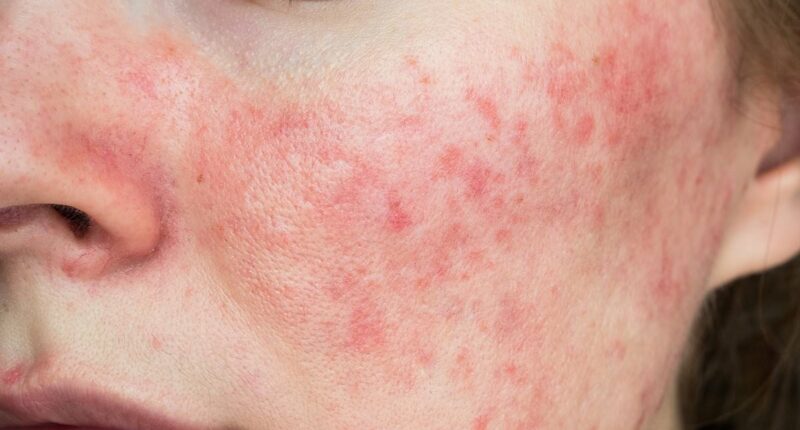Share this @internewscast.com
Autumn is the season for layering up—and that goes for your skincare, too.
As temperatures fall and the heating system is activated, many people experience their faces becoming tighter, drier, and more easily irritated—a condition dermatologists sometimes refer to as ‘autumn face.’
According to Dr Derrick Phillips, a consultant dermatologist and spokesperson for The British Skin Foundation, speaking to the Daily Mail, this is largely due to the condition of our skin barrier—the protective seal that safeguards the epidermis, the outer layer of the skin.
Dr Phillips explains, ‘The primary role of the skin barrier is to shield the internal environment—preventing germs, bacteria, and pollutants from entering, while ensuring moisture is retained.’
‘When that barrier is damaged, water leaks out and irritants get in, leaving skin dry, red and inflamed.’
Why your skin suffers in autumn
As the weather changes, humidity drops and the air becomes drier—and so does your skin. Central heating only makes things worse.
‘Try not to sit too close to the radiator,’ says Dr Phillips. ‘It can be surprisingly bad for your skin, as it strips away moisture.’

As temperatures fall and the heating system is activated, many people experience their faces becoming tighter, drier, and more easily irritated—a condition dermatologists sometimes refer to as ‘autumn face’
He recommends considering the use of a humidifier to add moisture back into the air. ‘It’s an effective way to reintroduce hydration to your skin,’ he says.
Prolonged, hot showers are also to blame. ‘They strip away the protective oils from the surface of the skin,’ states Dr Phillips. ‘This can lead to increased redness, tightness, and sensitivity.’
What damages the skin barrier?
Anything that strips or overloads the skin can weaken its defences—including harsh cleansers, over-exfoliating, sunburn, or using too many active ingredients such as retinol or acids.
Stress, ageing, genetics and certain health conditions such as diabetes can also reduce its resilience.
Skin disorders including dermatitis, eczema and rosacea make the problem worse by disrupting the barrier and triggering inflammation.
Dermatitis is an umbrella term for irritated, inflamed skin that can become red, itchy and sore—often caused by reactions to soaps, fragrances or detergents.
Eczema, also known as atopic dermatitis, is a long-term condition where the skin’s natural barrier doesn’t hold moisture properly, leading to chronic dryness, itching and cracking.

Skin disorders including dermatitis, eczema and rosacea make the problem worse by disrupting the barrier and triggering inflammation (stock photo)

Anything that strips or overloads the skin can weaken its defences—including harsh cleansers, over-exfoliating, sunburn, or using too many active ingredients such as retinol or acids
Rosacea is a common inflammatory disorder that causes persistent flushing, visible blood vessels and acne-like bumps, especially across the cheeks and nose.
Dr Phillips likens the skin barrier to a brick wall, with oils and fatty acids acting as the ‘mortar’ that holds it together.
‘When that mortar starts to crumble, everything becomes unstable—water escapes, and irritants seep in,’ he says.
‘That’s when skin starts to feel rough, sting after washing, or flush easily when you apply products.’
Over time, this constant low-level inflammation can make skin appear dull, uneven and more prone to breakouts or flare-ups of conditions like eczema or rosacea.
The right way to rebuild
A newly launched product earning rave reviews from dermatologists, including Dr Phillips, is Genaura’s Levagen+ Smart Face Serum—packed with a naturally occurring fatty acid called palmitoylethanolamide (PEA).
‘PEA supports the skin’s natural barrier function,’ says Dr Phillips.


Dr Derek Phillips (left), Genaura’s new Levagen+ Smart Face Serum is packed with barrier-boosting ingredients (right)
The serum also contains niacinamide (vitamin B3) to help refine pores, and hyaluronic acid to lock in moisture.
At £295 a bottle, however, it’s a serious investment.
Thankfully, the same barrier-boosting ingredients can be found in affordable products from brands such as The Ordinary and The Inkey List.
When choosing skincare, hydration is key. Look for formulas containing ceramides, hyaluronic acid, fatty acids and glycerin, which replenish the skin’s natural lipids.
‘If your skin is irritated, red and just unhappy, focus on moisture and reparative ingredients,’ Dr Phillips advises.
He also recommends switching cleansers as the seasons change.
‘If you don’t have blemish-prone skin and you’re dealing with dryness or redness, try an oil-based cleanser.
‘It helps to remove impurities while locking in moisture.’
Simplify to repair
If you’re already showing signs of barrier damage—flaking, redness or sensitivity—don’t panic. Healing takes time, but it’s absolutely possible.
‘The first thing to do is rationalise your routine,’ says Dr Phillips. ‘Strip it back to the basics — a gentle cleanser, a nourishing moisturiser, and a good sunscreen.
‘Once you’re using hydrating, non-irritating products, the skin barrier can usually repair within six to eight weeks.’
In more severe cases, prescription creams may be needed. ‘If you’ve tried everything and your skin is still sore or inflamed, see your GP or a dermatologist,’ he adds.
‘Topical steroids or antibiotics can help when there’s significant damage.’












